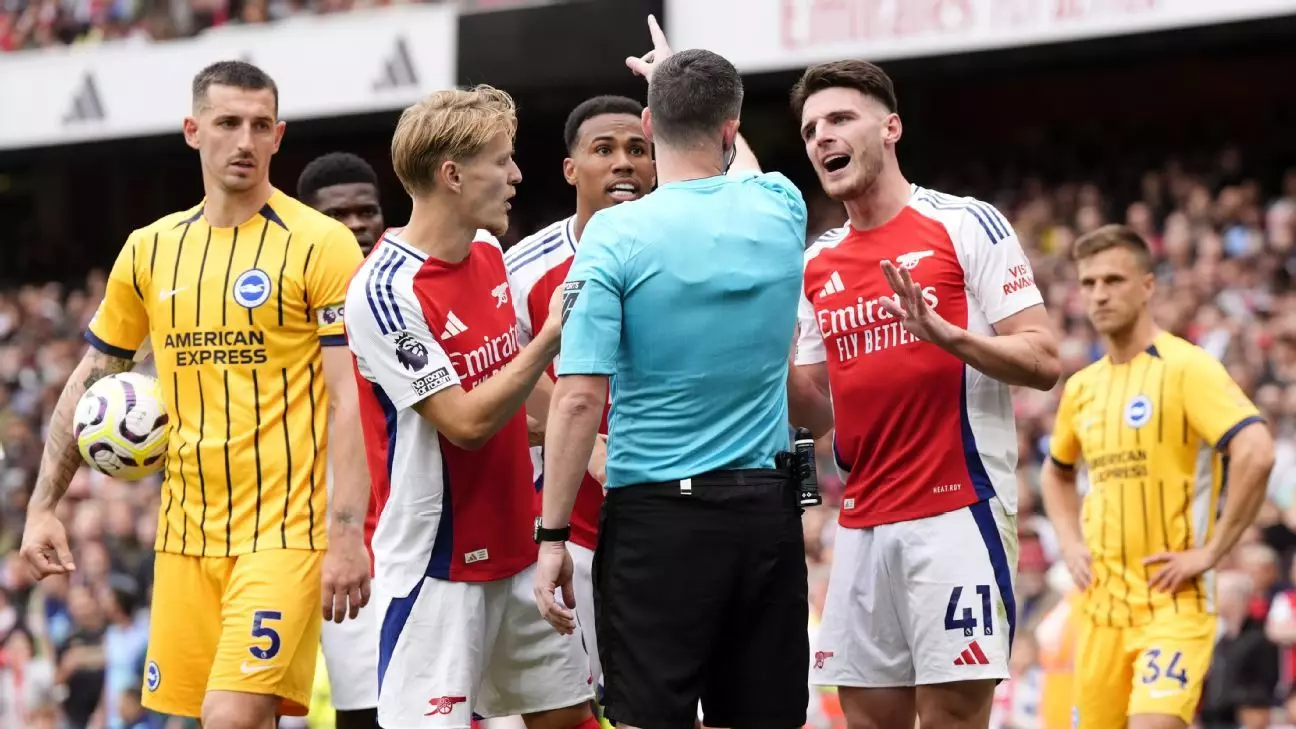The nuances of officiating in professional football have often been a source of contention, with the Premier League serving as a prime example of the scrutiny referees face. One of the most galvanizing incidents occurred recently involving Arsenal midfielder Declan Rice, who received a red card for an apparent infraction during a match against Brighton. This situation not only sparked debate among fans and players alike but also highlighted the pressures and challenges referees confront on the field.
Chris Kavanagh, the match referee, revealed a candid moment during the incident when he expressed his reluctance in showing a red card to Rice. During the match, Rice was already on a yellow card when he decided to kick the ball away to delay a free kick. The actions that followed led Kavanagh to make a difficult decision that left him feeling uncomfortable. It is particularly telling when Kavanagh remarked, “I don’t like it… but he’s knocked the ball,” reflecting the dissonance between a referee’s judgment and the strict adherence to the rules.
This statement sheds light on a recurring theme in the debate about officiating: the clash between the spirit of the game and the rigid enforcement of rules. Manager Mikel Arteta’s shock at the decision amplifies this conflict. Arteta’s discontent emphasizes not just his concern for Rice but also raises questions about the consistency of officiating, especially considering that Brighton forward Joao Pedro seemed to escape punishment for similar infractions.
In the broader context, the episode exemplifies the challenges of decision-making within the current VAR framework. Former referee Howard Webb, now a key figure in the PGMOL (Professional Game Match Officials Limited), expressed that Kavanagh did indeed act correctly, reinforcing the idea that adherence to pre-established guidelines is paramount. Webb’s commentary mirrors the systematic approach taken by referees, where it is crucial that players are held accountable for their actions once the whistle has blown.
The introduction of technologies such as VAR was aimed at minimizing errors, but as seen with multiple incidents involving VAR, mistakes can still have significant repercussions. For example, a decision involving Dominic Calvert-Lewin’s penalty against Brighton highlights the delicate ongoing dialogue between on-field officials and VAR. Webb acknowledged that the referee’s initial judgment was flawed and that VAR was instrumental in correcting the call, showcasing its potential to enhance the accuracy of officiating.
The problem of consistency, however, remains a pressing concern. The apparent discrepancy in how players are treated can lead to frustrations amongst teams. The fact that Arteta noted Pedro’s non-caution as an inconsistency only serves to highlight the broader issues of fairness and uniformity in officiating. Webb’s admission that Pedro should have received a yellow card underscores the need for referees to apply rules uniformly, ensuring that every player is subjected to the same standards of accountability.
Moreover, instances where VAR intervention did not lead to a satisfactory resolution, such as the disallowed goal for Dango Ouattara due to a perceived handball, illustrates how even technological assistance can come under scrutiny. Webb’s assertion that the ball struck Ouattara’s shoulder area raises questions about the clarity of handball rules and suggests that official guidelines may require reevaluation to account for the ambiguities present in modern football.
Reflecting on these recent events highlights the dynamic nature of officiating in Premier League football and the ongoing evolution of the rules governing the sport. As technology and communication improve, the expectations on referees will only increase, making it imperative that both officials and players adapt to this rapidly changing landscape. The Premier League’s “Match Officials Mic’d Up” initiative is a commendable step towards bridging the gap between fans and the officiating process, yet it must coincide with a concerted effort to ensure that the standards of fairness and consistency are upheld. Only then can the integrity of the beautiful game be preserved amidst the complexities of modern refereeing.

